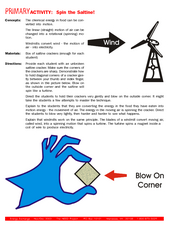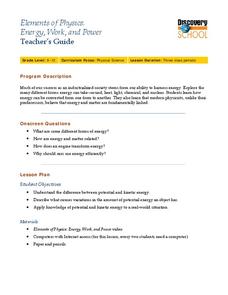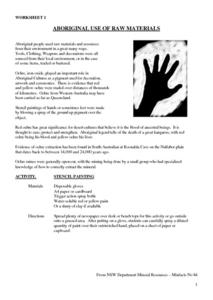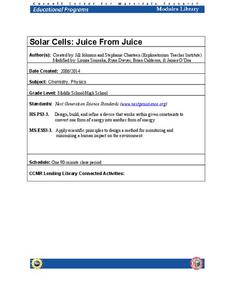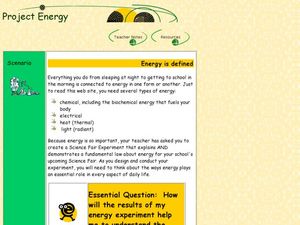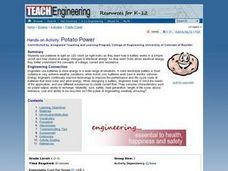Teach Engineering
Photosynthesis—Life's Primary Energy Source
Wouldn't it be great if you could produce your own food? Scholars learn about the processes of photosynthesis and cellular respiration in plants. They consider how to use photosynthesis as a model of an efficient system and how to apply...
Curated OER
Making Energy "trails"
Learners explore ten different stations that demonstrate either chemical, kinetic, or mechanical energy. They examine the way energy is transferred during each station's hands-on activity. Stations include vinegar and baking soda,...
Curated OER
How do plant & animal cells make and use energy?
Students show the relationship between the need for plants to undergo photosynthesis in order to generate oxygen. They see the flaws associated with this thinking because of the lack of CO2 and H2O and lack of sufficient gravity in order...
Teach Engineering
How a Hybrid Works
Work with your class to connect series and parallel circuits to hybrid cars. The lesson introduces basic circuit diagrams before having scholars apply the understanding of the difference between parallel and series circuits to hybrid cars.
Curated OER
Solar Kit Lesson #15 - Solar-Powered Electrolysis of Water and the Hydrogen Economy
An outstanding lesson plan awaits your physics fledglings! After reading about how hydrogen can act as an energy carrier, they examine the electrolysis of water using solar power. They test the gases produced for flammability and will...
Curated OER
Spin the Saltine!
Students investigate chemical energy. In this physical science lesson, students blow on saltine crackers to demonstrate how chemical energy in food can be converted to motion. Students compare the saltine cracker experiment to how...
Curated OER
Transfer of Thermal Energy
Students define temperature and heat, distinguish between temperature and heat flow, calculate amount of heat energy released or absorbed in chemical process, and design procedure, through experimentation, to gather and evaluate data to...
Curated OER
Energy Transformations
Students investigate energy and energy transformations. They compare the various forms of energy, create the circuit and sketch the connections. In addition, they label the circuit to identify areas where energy transformation is present.
Curated OER
Things That Glow: From Fireflies to Quantum Dots
Third graders observe light energy. In this heat and energy lesson, 3rd graders will study the concept of light as a form of energy. Students will examine the different forms of light and the type of energy it produces.
Curated OER
Energy, Work and Power
Young scholars examine the differences between potential and kinetic energy. In this physics lesson students view a video and apply what they learn about energy to apply it to real world situations.
Teach Engineering
Hydrogen-Oxygen Reaction Lab
High schoolers conduct an experiment using the reaction of hydrogen and oxygen. After pairs balance the chemical equation for making water, they mix different ratios of hydrogen and oxygen in a chemical reaction. Classmates...
Virginia Department of Education
Finding the Formula and Percent Composition
Do you have mole problems? If so, call Avogadro at 602-2140. The lesson starts with pupils working independently to solve for molar mass of ionic compounds. Then they learn to solve for percent composition and later perform an...
NSW Department Mineral Resources
Aboriginal Use of Raw Materials
What's the difference between base metals and precious metals? Experimenting with natural metals is an interesting way for kids to learn about the world around them. Use a resource that contains over 30 pages of worksheets and...
Cornell University
Solar Cells: Juice From Juice
Unleash the power of ... blackberries! Science superstars create solar cells using the juice of berries or leaves of a citrus tree in an engaging lab. In addition to offering a plethora of resources, the teacher's guide gives background...
NOAA
Seafood and Human Health
Whether your young biologists realize it or not, humans play a significant role in marine ecosystems. To help them understand this fact children first create graphical representations that show homo sapiens' place in marine food chains,...
Curated OER
Chemical Composition of American Coins
Students investigate the chemical composition of pennies dated 1983 or later. For this chemical composition of American coins lesson plan, students scratch the surface of the penny to expose the zinc core. They put the penny in...
Curated OER
Project Energy
Students explore multiple types of energy. In this energy lesson, students prepare a science fair project through completing a WebQuest. Students investigate radiant, thermal, and biochemical energy.
Curated OER
Ego Trip- Exploring the Inner Workings of the Human Body
Students gain an understanding of how systems and organs in the human body work. They create their own fictional account of a trip through the human body, and describe one response the body makes to stimuli.
Curated OER
Seed to Soup Organic Garden
Have your young biologists visit decomposition stations as they explore the process of organic material. This activity involves some set-up as kids will be visiting 13 desks to collect colored paper each representing a different element...
Curated OER
The Chemistry of Refining Crude Oil
Consider our energy sources: wood, coal, oil, uranium. Learners compare the pollution to energy produced for each. They practice fractional distillation of an alcohol/water mixture to simulate the process of refining crude oil....
Curated OER
TE Activity: Bubbling Plants
Students study a way to quantify the process of photosynthesis during a given time using the Elodea plant. They design a hypothesis that they test in the hands on activity. They compare the amounts of photosynthesis that occur during low...
Carnegie Mellon University
Battery Workshop
Introduce your class to the workings and parts of a battery-operated circuit. Pairs of pupils use lemons to make batteries and measure voltage and current with a multimeter. An accompanying worksheet is used for recording values and...
Curated OER
Lemon Batteries Revised
Fifth graders investigate how chemical energy in food and batteries is potential or stored energy. They discuss how batteries function, and create a class list of different forms of energy. Students then create a lemon battery that...
Curated OER
Potato Power
Students light a LED clock or light bulb using potatoes. They examine how a battery works in a simple circuit. They determine how chemical energy changes to electrical energy while experimenting with potato powered circuits.







